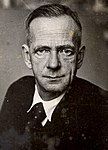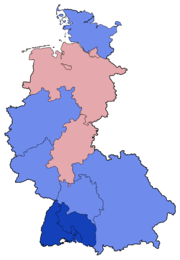West German federal election, 1949
|
|
|||||||||||||||||||||||||||||||||||||||||||||||||||||||||||||||||||||||
|
|||||||||||||||||||||||||||||||||||||||||||||||||||||||||||||||||||||||
|
|||||||||||||||||||||||||||||||||||||||||||||||||||||||||||||||||||||||
|
|
|||||||||||||||||||||||||||||||||||||||||||||||||||||||||||||||||||||||
| Election results by state: the lighter blue denotes states where CDU/CSU had the plurality of votes; darker blue denotes states where CDU had the absolute majority of the votes; and pink denotes states where the SPD had the plurality of votes | |||||||||||||||||||||||||||||||||||||||||||||||||||||||||||||||||||||||
|
|||||||||||||||||||||||||||||||||||||||||||||||||||||||||||||||||||||||
Lutz Graf Schwerin von Krosigk
(Leading Minister until 23 May 1945)
Federal elections were held in West Germany on 14 August 1949, with a further eight seats elected in West Berlin between 1949 and January 1952 and another eleven between February 1952 and 1953. They were the first contested elections since 1933 and the first after the division of the country.
After World War II, the German Instrument of Surrender and the country's division into four Allied occupation zones, the elections were held in the Federal Republic of Germany, established under occupation statute in the three Western zones with the proclamation of its Basic Law by the Parlamentarischer Rat assembly of the West German states on 23 May 1949. Most West German parties at the time of the 1949 Bundestag election were committed to democracy, but they disagreed on what kind of democracy West Germany should become.
...
Wikipedia




